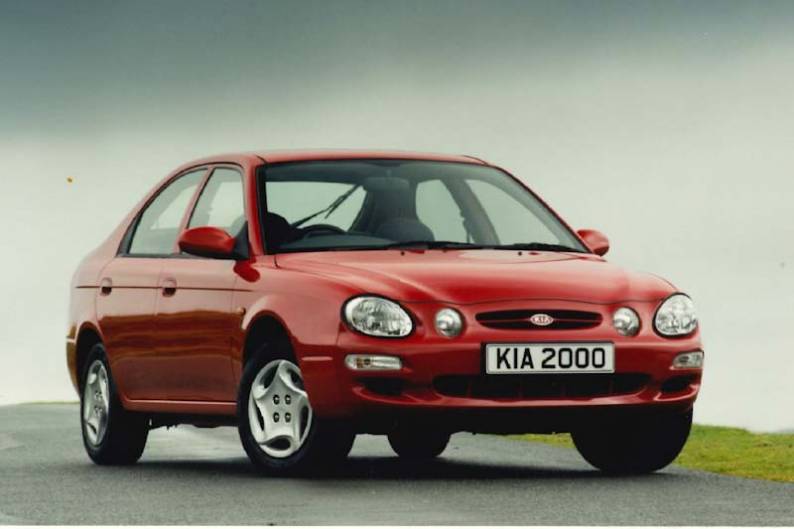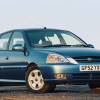
RAC sale – up to 33% off*
• Roadside cover from £5.29 a month†
• We get to most breakdowns in 60 mins or less
• Our patrols fix 4/5 breakdowns on the spot

BY ANDY ENRIGHT
Introduction
You're looking for value. Lots of car for the money and you don't really care what badge it wears on its nose. It has to look modern, be faultlessly reliable and practical. To you a car represents transport, an overhead that needs to be minimised. You are the target customer group for the Kia Shuma, a cut-price five-door version of the Korean company's Mentor saloon. If you are of this persuasion, it would seem illogical to throw away a whole wad of money in depreciation by buying new. A used Shuma is a far cannier investment, and one that whilst not the most obvious choice available, represents an effective way of getting a nearly new car on the drive for less than you may imagine.
Models
Models Covered:
(5 dr hatchback 1.5, 1.6, 1.8 litre petrol [S, SX, GSX, ICE])
History
The Kia Shuma was launched in this country in September 1999 alongside the Sedona MPV and the Clarus saloon. This Korean tactic of launching a whole wave of models en masse had been seen before with Daewoo's triple-pronged landing of the Nubira, Leganza and Lanos models, and whilst it was undoubtedly a major step for Kia, the launch didn't create much of a stir. The Shuma was a reasonably smartly styled five-door interpretation of the Mentor, the four-door versions of which soldiered on as the Mentor II. It was available in either 1.5-litre or 1.8-litre guise, and represented a more practical take on the Mentor formula of decent build quality using budget materials. The 1.5-litre model was made available in manual S or SX trim with a choice of manual or automatic gearboxes. The 1.8-litre cars were offered in GSX trim only, again with a choice of transmission types. In February 2001, both engines were replaced by a single 1.6-litre unit, offered only in S and SX guises. Early 2002 saw the range being replaced by the Shuma II. In essence a fairly comprehensive facelift, the Shuma II made a good job of rectifying several of the car's minor shortcomings. By the start of 2004, the Shuma range had been scaled back to one solitary model - the 1.6-litre Shuma ICE - in preparation for the arrival of the new Shuma.
What You Get
You may not expect a great deal paying such a trifling amount for a nearly new car, but the Shuma isn't the lacklustre disaster many would imagine. Of the three models from which to choose, the 1.8 GSX is probably the best bet. The 1.5 S model is pretty uninspiring, but the SX adds tinted glass, split-folding rear seats, central locking, a height-adjustable driver's seat and power for the windows and mirrors. GSX buyers meanwhile, can also expect alloy wheels, a rear spoiler, a sunroof, ABS and a front passenger airbag.
All models come with the single five-door body style - though a four-door saloon known as the Mentor II is available, identical in every respect apart from the absence of a 1.8GSX flagship version. The styling is certainly neat, especially at the back. Whilst it won't be vying for any 'Rear Of The Year' awards, the tail of the Shuma has a pleasantly pert, chiselled look, and some surprisingly classy badge detailing.
As we've said, despite the latest look, the new Shuma shares much with the original Mentor - which had a surprisingly impressive pedigree. Its floorpans, engines and transmissions came straight from Mazda's 323, the bodywork was created by British design consultants IAD and the handling originally fine-tuned in association with Lotus. The result was one of South Korea's best selling cars and a model which also built up a strong reputation for reliability and value in the USA. Now, with a shot of much-needed identity, this Focus-sized five-door for a Fiesta-sized fee hasn't created much of an impression on the UK market, but as a used proposition certainly makes a rational case for itself.
What You Pay
Please fill in the form here for an exact up-to-date information.
What to Look For
Make sure the car is in perfect condition. There's no reason why it shouldn't be, as it will be within warranty, but check for those parking knocks and scrapes that are easy to pick up in multi-storey car parks. The ventilation systems aren't too great, so make sure that it's working to its full capacity else demisting will be a chore in the morning. Otherwise insist on a full service record and contact a few franchised dealers to try to find the best bargain available.
Replacement Parts
(approx based on a 1999 Shuma 1.5S) The Kia Shuma offers some of the cheapest parts prices around. A new clutch assembly retails at around £170, while front brake pads are around £30, with rear brake shoes only a few pence more. A new radiator is around £80 and an alternator an eminently reasonable £120. To replace a headlamp will see change from £80.
On the Road
On the road, anyone who did drive the old Mentor will find the ride and handling of the Shuma a significant improvement, thanks to re-engineered suspension which brings a better ride, sharper handling characteristics and improved stability. The Koreans claim however, that the long distance comfort that was the saving grace of the old car has been preserved. Certainly, it's still predictable, safe and easy to drive, designed for those wanting to get from A to B as comfortably as possible, rather than driving enthusiasts.
Once up to speed, the Japanese-designed 1.5-litre powerplant is willing enough, with rest to sixty accomplished in around 13 seconds on the way to a maximum speed of 106mph. The engine is not particularly quiet though, and if you plan to undertake long motorway journeys, the 1.8-litre GSX is by far the better bet. If you do opt for the 1.5-litre cars, you should average approximately 30mpg around town and between 40-45mpg on the open road.
Overall
The Kia Shuma is not a wildly inspiring drive, but if you're tempted to dismiss it out of hand, take a moment to think of its qualities. It's cheap, well equipped, reliable and modern looking. Nearly new examples will have most of the benefits of buying new with a handy cost saving. Which, if you've managed to read this far, is what you'll be most attracted to. If you're a keen driver, go for an older Peugeot 306 but otherwise take a look at a used Shuma. Perhaps Kia's promotion of the model sells it short. It has a bit more to offer than a dinky sticker price.







